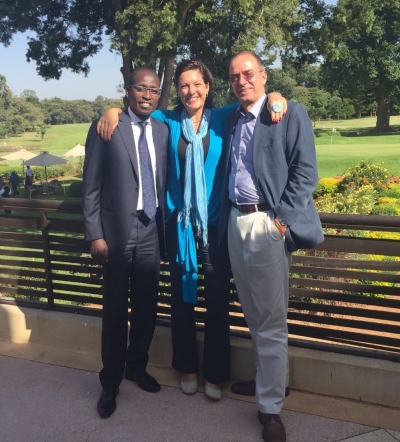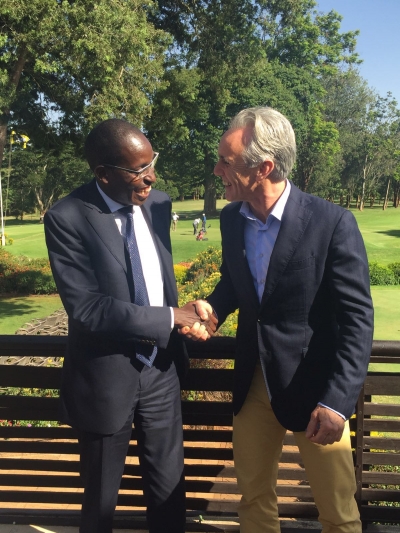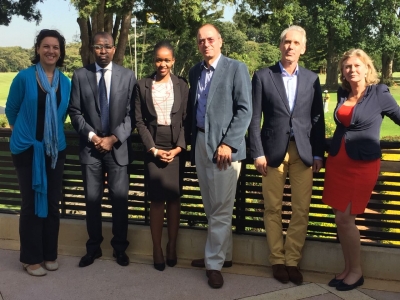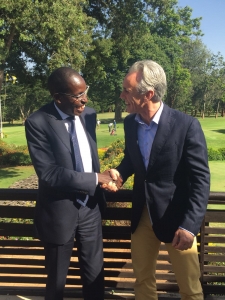Het bestuur van de NGO in Kenya werd jarenlang vertegenwoordigd door Lammert Braaksma (tevens oprichter van de stichting), Kees Punt en Lucy Waweru, The NGO board in Kenya was represented for years by Lammert Braaksma (also founder of the foundation), Kees Punt and Lucy Waweru. Na vele jaren van inzet voor de stichting wordt dit bestuur nu vervangen door drie nieuwe bestuursleden. Evans Monari zal actief zijn als voorzitter, Jaap van Luijk neemt het financieel management in Kenia op zich en Esther de Vreede zal actief zijn als secretaris van het team. Lees meer over deze drie nieuwe bestuursleden in een interview.
Om de nieuwe bestuursleden beter te leren kennen werden onlangs alle drie de leden geinterviewd door FFL alumni Remington Otieno Bonface. Remington is recent afgestudeerd voor de ‘advocates training’ aan de Kany School of Law.
Evans Monari:
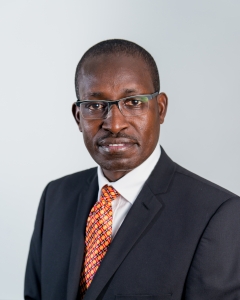
1. Please tell us something about yourself?
I am an Advocate of the High Court of Kenya and a Partner and Head of Litigation at Bowmans Kenya, a leading Pan- African firm. I am a husband to one wife and a father to two children, a boy and a girl.
2. What are your passions and personal goals in life?
I am glad that at my age, I have achieved my goals in life. I have a passion for politics and therefore a political career might just be looming. I am certain that my legal expertise would come in handy at the Senate.
3. How important was education in your life?
Education has been very essential as there is no way to become a lawyer without education.
4. What do you think of the current opportunities for young Kenyans in terms of education?
The current opportunities offered by government are twofold. There is free primary education for public schools and loans for higher education popularly referred to as HELB as the said loans are offered by the Higher Education Loans Board. The government has since announced that it intends to commence free secondary education in 2019. Therefore, presently there is a huge gap in accessing secondary education for a poor Kenyan yet essentially one should atleast be educated until secondary school level to enable them even access tertiary education in the event accessing university education is a problem.
There are more opportunities in terms of education scholarships for students in the private sector. Non- Governmental Organisations like Friends For Life have really tried to close in on the gap.
5. Why did you decide to become a board member of Friends for Life Foundation?
I am currently paying school fees for very many children from around my village and I continue to receive more requests, therefore the core nature of Friends for Life is dear to my heart as it is a cause I am highly in support of.
6. What will your role and value be for the Friends for Life Foundation?
My role will be to ensure that the spirit of the Foundation burns hotter during my tenure as Chairman. This will be enabled by organizing forums where professionals from various organizations can gather to financially support the program. I would also start a mentorship program that will enable the students obtain life skills as success is not only built on academic skills.
7. What are your thoughts and dreams about the future of Friends for Life Foundation?
My vision is to spread the benefits of the Foundation beyond Kwale County even if this means just sponsoring one student in each County in Kenya (as a start). I would further like to see the Foundation partner with other Multinational companies to enable it spread its wings to sponsor more students.
8. What advice would you give to the students and graduates of Friends for Life Foundation for their career or life in general.
I know every graduate expects to get a job after meticulously working hard in school but that is not the case especially in a third world country. Therefore, like I always say, if opportunity does not know you might as well build a door.
A Friends for Life beneficiary must always have character. Even if they get the best job, they must know that clients do not hire organisations, they hire personalities. So they should concentrate on building their character as they will need it when they aren’t under the umbrella of an organization.
Be courteous to people. They will always want to associate with you at a later date.
A Friends for Life beneficiary must also always be aware that they owe a duty to the next beneficiary to study. They must therefore work twice as hard to keep the program going as they must give back to the Foundation to enable another student learn.
Jaap van Luijk:
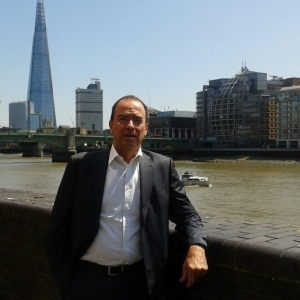
1. Please tell us something about yourself?
I am a banker, started my career in what used to be Amro Bank, now a days ABN-AMRO. Moved to South Africa in 1982 to work for Nedbank. Left Nedbank in 1997 started an office for American Express Bank in Johannesburg which covered East Africa. So my first interaction with Nairobi was in 1998 and I have been coming here ever since. In 2007 I joined Standard Chartered Bank in Johannesburg, then came I here in 2010 to open the office of HSBC. The office was located in 14th Riverside Drive, unfortunately, due to various circumstances it was closed it in 2014, when I rejoined Nedbank taking over the reins at the Representative Office. Nedbank is the first Carbon Neutral bank on the continent
I am married with two children, and we are waiting for our second grandchild, the children live in Holland.
2. What are your passions and personal goals in life?
The reason why I joined the Foundation is because education to me forms the foundation for a successful nation. I am very keen to have people develop themselves. I have got everyone in my office studying. I have told them that they have to advance their studies if they expect to improve their life style. When I was asked by one of the board members to join, and it was explained to me what the Foundation is all about, I said why not. I feel like I need to give back to Kenya. I like the concept of Friends For Life and being that it has got Dutch roots, I am very keen to see the Foundation grow and to become more meaningful.
3. How important was education in your life?
Education is important. My generation could get away with not going to university. You could be a self-made man, join an organization and just develop yourself. Nowadays if you don’t have a degree, you going to struggle in the job market. Education gives you independence. It gives you the opportunity to better your life, support your family, giving back to the community. That is why I believe that you have to give your children a better education than you had. Life is tough, and education is one way to get out of poverty.
4. What do you think of the current opportunities for young Kenyans regarding education?
Kenya, from a geographical point of view, is the only country on the continent where you can connect to any other country on the continent within 5 hours. The country has a very entrepreneurial workforce. There is a certain amount of energy in Nairobi. Everyone is trying to make a living.
In the six years, I have been here I have seen a tremendous amount of growth in infrastructure. Kenya has relative good education compared to many other countries on the continent, the country has a well-educated work force, again compared to other countries on the continent.
Those who are in the diaspora are sending money back which contributes to the economic growth, contributes to the wellbeing of their families at home.
5. Why did you decide to become a board member of Friends for Life Foundation?
I like to see the Foundation grow and with the help of local sponsors, Friends for Life can support more students, and with that build a more prosperous Kenya.
6. What will your role and value be for the Friends for Life Foundation?
I am on the board because I want the Foundation to grow. If I look at the number of students that we support, it is a relatively small compared to what is needed. The real aim for me together with my fellow board members, is it grow Friends for Life and to become a more substantial education-based NGO.
7. What are your thoughts and dreams about the future of Friends for life Foundation?
I hope that the new board, under the leadership of Mr. Evans Monari will work to make the organization grow. I want to see us grow into a meaningful education foundation. If I look at some other NGOs in Kenya that are supporting education, I realize that we are tiny, but we can grow, we need to aspire to grow by more than five-fold, within the next five years.
8. Which advice would you give to the students and graduates of Friends for Life Foundation for their career or life in general?
Embrace the opportunity that the Foundation gives you. Build a career, but also offer something back to the Foundation. Use your experience to help others follow in your footsteps. Help others create a better life and a better country.
Esther de Vreede:
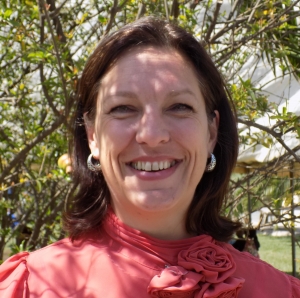
1. Please tell us something about yourself?
I am a mother of two children, age 8 and 11. I have been in Kenya for the last 15 years, traveled a lot in the East African region. I came here to do development work, mainly in the water sector, but I over the years I have done some projects in the area of health and education. For a long time, I worked with different NGOs before I went freelance as a consultant. In this new capacity, I have worked with several non-governmental organizations, the UN, and the Kenyan government. Now I am going back to the Netherlands to take on a new role.
2. What are your passions and personal goals in life?
I believe in helping others to improve their lives. I feel committed to the betterment of humanity. I have worked in the NGO sector mostly doing works that are beneficial to the community, and I feel that I am in a place where I want to be.
3. How important was education in your life?
I think I have been lucky to be born in a place where I had all these opportunities that most don’t seem to have. In the Netherlands education is free. You pay high taxes, but you get good roads, excellent healthcare, and other social amenities. Education is free, pretty much in primary and secondary school. The cost is minimal, at the primary level, you would pay about Ksh. 5,000/= per year and for secondary you would pay Ksh. 25,000/=. It is only at the university level that you would be expected to pay a bit more. Consequently, I was able to study with relative ease and develop a career of my own. Partly, I attribute this to the system in Netherlands which allows one to have high-quality education for everyone. I was able to do my masters and come to Africa and get a job. The different degrees I have done have been quite useful in shaping my career.
4. What do you think of the current opportunities for young Kenyans in terms of education?
I think Kenya has made some progress in the 15 years that I have been here. If you look at innovations such as MPESA, the developments in Information Communication Technology, you see a lot of things that have been developed by brilliant Kenyans that have gone global. However, the existing opportunities have not been available to all Kenyans, particularly those who young people from marginalized communities. There are a lot of people left behind, girls who have trouble completing their studies due to poverty, early marriages etcetera. Several graduates are unable to get work, meaning that there is still some gap. Perhaps it is the weaknesses in the education system. The educational system must be able to assist the students in solving problems.
5. Why did you decide to become a board member of Friends for Life Foundation?
My intention to join the board for Friends for Life was motivated by an interest in helping young people to realize their potential. I have known the chairman, Mr. Evans Monari socially for a while and when he approached me to join the board, I guess it was due to my background in development, education, and NGOs. Perhaps also the fact that I am Dutch. It could have motivated him to invite me to join the board due to its heritage. To me, this is a way of giving back to the society. I will be glad to see young Kenyans getting a good education and improving their future through opportunities such as those offered by Friends for Life. I hope that I can be able to assist some of the students in getting stable jobs that can help them to realize their full potential.
6. What will your role and value be for the Friends for Life Foundation?
Even with my new job I still want to involved with Friends for Life, whether in the Netherlands or Kenya because I will be traveling back and forth. I would like to contribute my experience and support the foundation in its effort to help needy students and to assist in the identification of some expertise that we can tap into. I think we can grow the network of Friends for Life for the benefit of more students, mostly with emphasis on sustainability and the quest for local funding so that it is not just about supporting coming from the Netherlands. Kenya is growing into a middle-income country, and I believe it can support the foundations because people are always willing to give back in this country. We just need to get the right mix.
7. What are your thoughts and dreams about the future of Friends for life Foundation
I wish to see more growth in the initiatives of Friends for Life. I think we can do a lot of growth in Kenya. I am not saying we go national, but I would like to see Friends for Life having a manageable number of students beyond what it currently supports. This can be achieved by increasing the participation of local contributors besides the strengthing of the alumni network. What I like about Friends for Life is the fact that beneficiaries are supposed to sponsor others students when they are established in stable careers.
8. Which advice would you give to the students and graduates of Friends for Life Foundation for their career or life in general?
The students must be able to believe in themselves. They must be able to make the best out of themselves with everything they have. A good student should be a role model within the community. They should not allow anybody to talk them out of what they want to achieve in life. Everybody is endowed with some skills, and each person must use their gifts for the betterment of themselves and the society.
